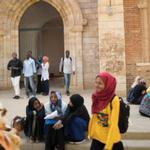Placing Sudan on the agenda at the Humanitarian Leadership Conference in Doha
On 8-9 April 2025, Sudanese feminist leaders and researchers participated at the Humanitarian Leadership Conference in Doha, bringing perspectives from Sudan’s ongoing humanitarian catastrophe to the global stage.
The two-day event, was jointly organised by the Center for Conflict and Humanitarian Studies (CHS) at the Arab Center for Research and Policy Studies and the Center for Humanitarian Leadership (CHL) at Deakin University, and gathered more than 250 humanitarian practitioners, academics, and researchers from over 85 countries, in addition to hundreds of online participants, to debate ‘Transformative leadership in times of polycrisis’.
The conference served as a hub for discussions about the future of humanitarianism at a moment of unprecedented strain. With the USA abdicating from its role as the world’s largest humanitarian funder, the retreat of European funders, and the egregious flouting of international law with the support of Western countries at a time of compounded multiple crisis in Sudan, Palestine, the Democratic Republic of Congo and elsewhere, tens of millions of people globally suffer the consequences.
Sudanese feminist researcher Sara Abbas, a long-time civil society practitioner from Darfur, and Safa Alagib, a prominent women activist and head of the women-led organization Community Development Association (CDA), were able to travel to Doha and participate with support from the Sudan-Norway Academic Cooperation (SNAC).
During the conference, Sara Abbas, Safa Alagib, and Amel Gorani (who participated digitally) organised the panel ‘Humanitarianism and feminist leadership in the polycrisis: Thoughts on and from Sudan’. The panel focused on the current war and the subsequent humanitarian “polycrisis” in Sudan, described recently by the UN as the biggest humanitarian crisis ever recorded. The panel began by asking: What does it mean to live in a perpetual and ever-deepening crisis? Drawing on lived experience and interviews with members of organisations, collectives, and groups in Sudan that describe themselves as feminist, or that are doing “feminist work” in various parts of the country (and amongst the displaced in neighboring countries), Sara Abbas interrogated the colonial and patriarchal conceptions of crisis and humanitarianism that still dominate policy and practice today in regions like sub-Saharan Africa, where mass-scale death has been normalized. Through this critique and sharing the stories of feminists in Sudan living the crisis and helping their communities survive, a picture of collective leadership rooted in intersectionality and a politics of care emerged.
Safa Alagib also brought the personal perspective into the discussions, delving into how the experiences of being displaced by war shapes one’s life also on the political and professional level. Having fled from Darfur, having lived through famine and the rise and fall of ‘peace agreements, and political unrest, she spoke about life in camps, organising women’s groups, the incredible needs (both protection needs and material needs), and the nexus between peacemaking and humanitarianism. Alagib was also invited to participate as a speaker in a plenary session on mutual aid in humanitarian response.
The ‘Humanitarianism and feminist leadership in the polycrisis: Thoughts on and from Sudan’ was very well attended and included both policymakers and academics.
Project
